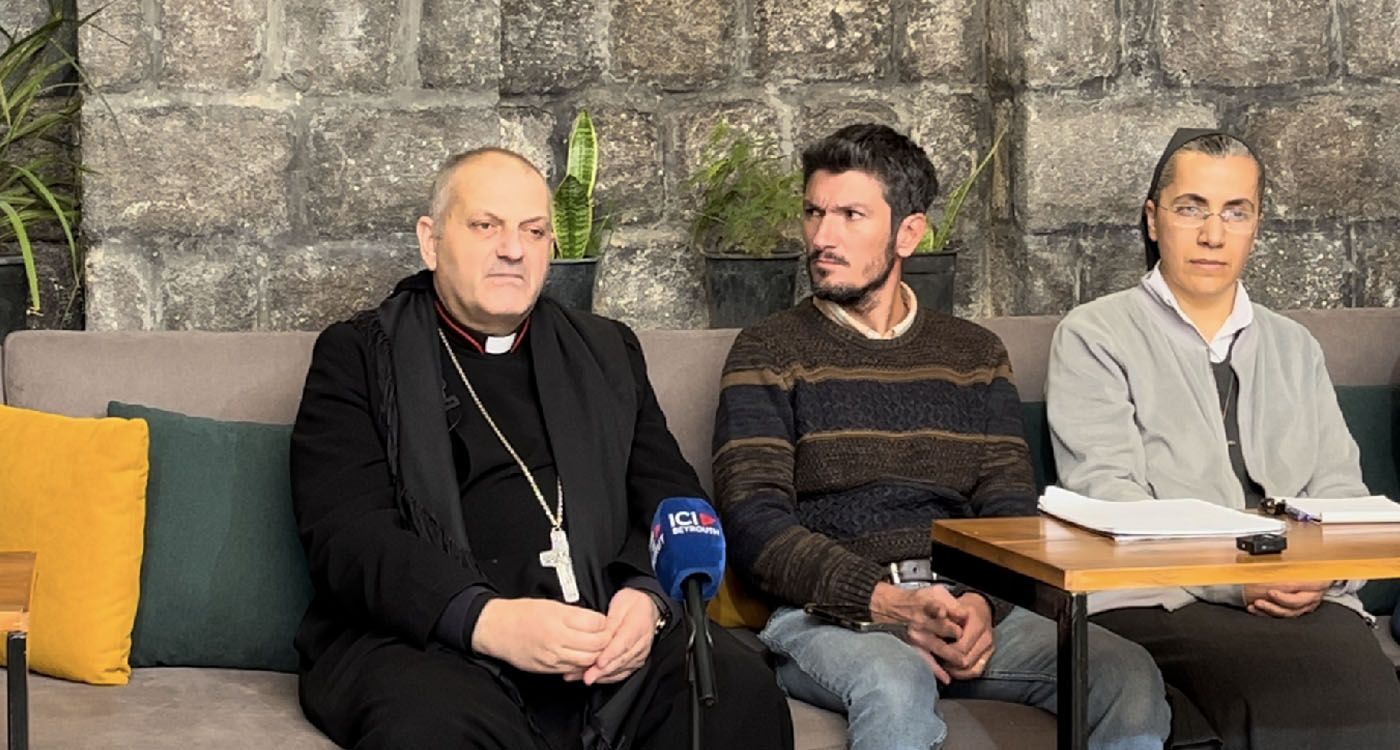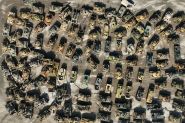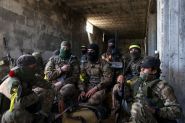- Home
- Middle East
- Syrian Christians Who Took on the Challenge of Trust

From left to right: Archbishop Jacques Mourad, Syriac Catholic Archbishop of Homs, Vincent Gelot, representative of L'Œuvre d'Orient in Syria and Lebanon, and Sister Jihane of the Soeurs de Besançon, head of the largest Christian school in Damascus. ©Fady Chaanine/This is Beirut
In a show of support for a new Syria following the fall of Bashar al-Assad's regime after 13 years of devastating war, L'Œuvre d'Orient — a humanitarian institution with a 170-year history in the country — held a press conference in Damascus on Friday. The event aimed to assess the situation and gauge the sentiments of Syria's Christian community, who remain caught between relief and concern, unsure which feeling to embrace.
Introduced by Vincent Gelot, L'Œuvre d'Orient's representative in Syria and Lebanon, the conference featured addresses by Archbishop Jacques Mourad, the Syriac Catholic Archbishop of Homs, Hama and Debek, Sister Jihane, a member of the Soeurs de Besançon (Sisters of Besançon) and director of Damascus' largest Christian school, and Salim Safir, director of a socially-oriented enterprise established by L'Œuvre d'Orient in Syria.
Panic swept through the population as Hay’at Tahrir al-Sham (HTS) forces drew closer to Damascus. Events unfolded at a rapid pace. Had Abu Mohammad al-Joulani, the group's leader, truly broken ties with the Islamist network, as he claimed? Would the Islamic State, part of the advancing coalition, impose its reign of terror on the population, as it had done in Iraq's Nineveh Plain in August 2014? Should people flee to Wadi al-Nassara, a predominantly Orthodox region near the Lebanese border?
But the promises and statements made by the leader of the coalition, Ahmad el-Chareh, also known as Abu Mohammad al-Joulani, a Syrian national, reassured many people following the capture of Aleppo. To the Christians, a minority reduced to an ultra-minority (about half a million currently, out of a population of 25 million), he promised that their religious freedoms would not be threatened and that citizenship would take precedence over religious affiliation. Christians would be “Syrians like any others,” in his words. These remarks marked the end of the “alliance of minorities” policy advocated by the previous regime, which had treated Christians as a “protected minority” against the Sunni threat.
Al-Joulani's statements appear to have convinced Archbishop Jacques Mourad, who has firsthand experience with the Islamic State, having been held hostage by the group for five months in 2015. He was also a friend of Paolo Dall’Oglio, the Jesuit priest who disappeared in July 2013 in Raqqa, the capital of the Islamic State, and was likely executed — a “martyr of a reconciled Syria.”
A member of the Mar Moussa community founded by Father Dall’Oglio, the Archbishop who previously stated to the press that “Syrians are experiencing freedom for the first time,” has chosen to place his trust in the current situation. He begins by correcting the figure of half a million victims of the previous regime, as presented by Vincent Gelot in his introduction. According to the Archbishop, this figure overlooks the thousands of political prisoners, prisoners of conscience, and regular citizens lost to the Machiavellian prison system established by Bashar al-Assad, a system reliant on a pervasive network of informants. He asserts that the actual death toll is “much higher,” when taking into account “the thousands of names listed in the registers of Syrian prisons.”
A staunch advocate of dialogue, the Archbishop promotes the idea of a “revolution of perspective,” one that would allow Christians in Syria to see the person behind the fighter and look beyond the scruffy appearance of those who walk through the Omayyad Square with their fatigues and Kalashnikovs.
“There is work to be done to open our eyes. We must heal our memory,” he emphasizes. “We need to support this new state, which presents itself as Muslim. Let’s not be deceived by appearances; let us not judge these fighters solely by their weapons and disheveled hair. Let us not be afraid; let us trust in God's Providence. The leaders of this state have been clear: Christians are part of the Syrian people, just like everyone else. We are not a separate minority. We are called to take responsibility in leading this country.”
“It’s a long process, but we must carry it out. We are called to rebuild Syria, not to take the path of exile,” he insists.
During a question-and-answer session that followed the conference, Archbishop Mourad spoke out against a plan attributed to the Minister of Justice of the interim government, which aimed to make Islamic Sharia the foundation of the state’s institutions. He clarified that he had conveyed his opposition to this idea to the current Minister of Justice, Chadi el-Waisi, when Hay’at Tahrir al-Sham entered Homs. El-Waisi had previously been a member of a governmental structure in the region of Idlib.
“We have no place in this structure. We cannot replace the Palace of Justice with Sharia.”
“He listened to me carefully,” Archbishop Jacques Mourad added.
The transitional government is expected to remain in power until March 1, 2025, although some argue that more time will be needed to draft a new constitution.
Moreover, Archbishop Mourad strongly rejected the notion that Christians “need protection from an external power,” as suggested by a journalist. He further called for the lifting of US and international sanctions on Syria, emphasizing that “these sanctions have not affected the ruling class, but have driven the people into misery.”
Overcoming Poverty
Overcoming poverty was one of the key topics raised by Sister Jihane, the director of Al-Riyaha, the largest Christian school in Damascus (1,300 students), which was destroyed during the war.
The nun, in the early stages of her vocation, underlined, “Yes to hope, but we must remain realistic.” She went on to highlight the severe economic challenges faced by families, 95% of whom live below the poverty line. She pointed out that a month's salary barely covers the cost of a gas canister for household use, a point confirmed by the directors of the Hope Center social programs, founded by L'Œuvre d'Orient in Aleppo and Damascus.
To illustrate the meaning of civic responsibility, Sister Jihane explained that the community took the initiative to organize the overflowing trash in the streets.
She shared with the audience and the journalists the doubts that had troubled her small community of five nuns as HTS troops advanced, as well as their courageous decision to stay despite the fear. “The initial reaction was to flee. But after praying and reflecting, with each sister free to make her own decision, we chose to stay close to our people. This way, we were able to reassure those around us. Our vocation is to be messengers of peace and to welcome everyone with dignity.”
“We must teach the values of brotherhood and love to prevent the crimes of the former regime from recurring. To achieve this, we need to rethink our language and establish new human connections.”
Read more




Comments